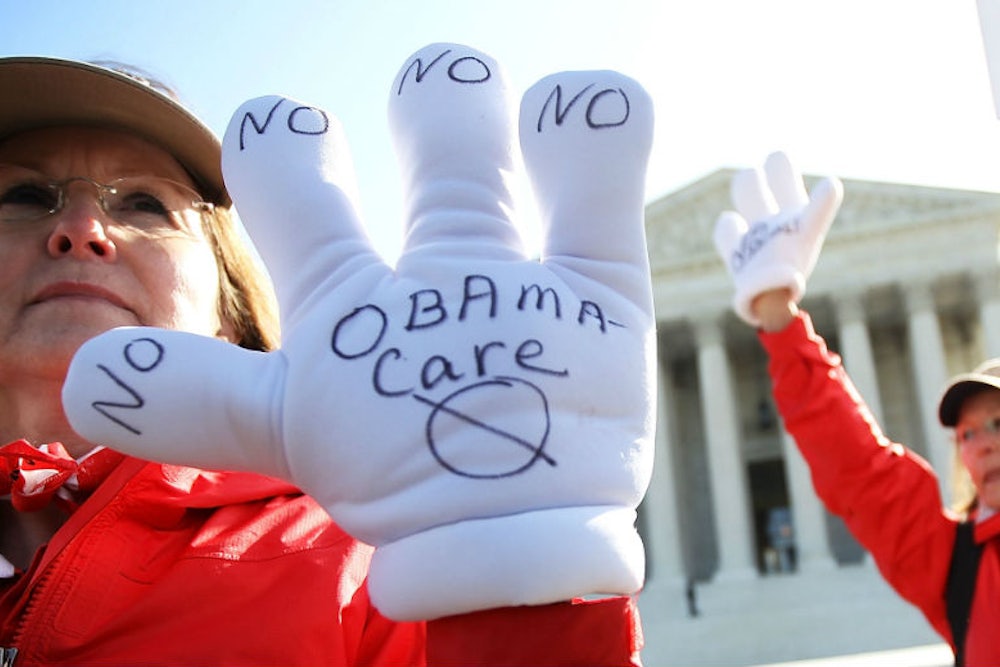When the Supreme Court announced on Friday that it would hear King v. Burwell, the latest conservative legal attack on Obamacare, the immediate liberal reaction was fear of the potential consequences. Jonathan Cohn warned that over four million Americans could lose insurance subsidies, and Brian Beutler’s morbid prediction that of many of these could die as a result ran under the ominous headline “The Supreme Court Is Now a Death Panel.” Fear, however, turned to fury Monday when New York Times columnist Paul Krugman prospectively denounced any judge who votes against the Affordable Care Act as “corrupt” and “willing to pervert the law to serve political masters.”
That's absurd. Alleging corrupt partisanship by conservative judges is not only uncharitable, it also misses the proper target: the cynical campaign that brought this suit to court in the first place.
Krugman is so confident in his own view—that a clause in the ACA limiting subsidies to state-run health-care exchanges is a judicially correctable drafting error—that he can’t even imagine that someone else could think differently. But there are plenty of conservative true believers on this issue. A principled commitment to a particularly mechanical and localist brand of interpretive textualism really can lead to an honest view that eviscerates the ACA. Textualism certainly doesn’t necessarily lead this kind of outcome—and I think it shouldn’t—but Krugman’s conviction that only pernicious intent could produce a conservative result reflects a depressingly limited imagination.
Rather than ad hominem attacks on judges, we should condemn the unprecedentedly cynical lawsuits that have brought us here. By now, Americans are used to playing out much of our politics in the courts. But even in the most politically fraught cases of the past, a rough correspondence between advocates’ motivations and their arguments preserved a modicum of integrity to the process. When conservatives first attacked the ACA in the courts, they did so by arguing that the individual mandate was an unprecedented expansion of federal power, and the litigants were people whose freedom had been genuinely restricted. Fair enough. Those arguments were an accurate reflection of principled conservative objections to the scope and reach of Obamacare. When conservatives again challenged portions of the ACA in the Hobby Lobby case, it was on behalf of an understanding of religious liberty to which conservatives are genuinely committed.
There is no such integrity in the latest round of ACA challenges. Everyone, including the law’s challengers, agrees that the current implementation of the ACA is far more faithful to the goals and purposes of the law, and to the intentions of those who passed it, than the opposing interpretation the challengers advocate. The primary question is one of intepretive theory: Should the intentions of the law’s authors, and the apparently self-defeating consequences of challengers’ opposing interpretation, matter? Narrow-scope textualist judges think not, and they are inclined to impose on the Obama administration a poison-pill interpretation that eviscerates the law. Slightly more charitable readers who think context, intent, and purpose are integral to interpretation are more likely to side with the administration.
As an abstract educational exercise examining the different schools of statutory interpretation, the case is actually quite illuminating. But think for a second about the lawyers rather than the judges: What kind of political hostility brought this case to court? The challengers know their interpretation of the law is uncharitable in the extreme, and yet they push for it anyway in order to force the law’s implosion. The motivation for these lawsuits is opposition to the ACA as a whole, not principled objections on the actual issue in question—the IRS’ understanding of the subsidies passage.
The plaintiffs in this case, who are actually the recipients of the contested subsidies in healthcare.gov states, probably did not even see themselves as “injured” until they were tracked down by an ingenious conservative search for a handful of people in a narrow income bracket in a select few states. In order to sue, the ACA’s opponents needed to find someone who could claim “injury” by the IRS giving out extra money. That's not so simple. But by hunting down a few willing plaintiffs whose IRS credit bumped them up an income bracket and made them liable for penalties under the individual mandate, the ACA challengers found an Archimedes lever with which dismantle Obamacare. That’s not politics as usual, or even political lawsuits as usual—it’s scorched-earth opportunism. These cynical political operatives, not the textualist judges who feel compelled to go along with them, should be the targets of liberal fury.
